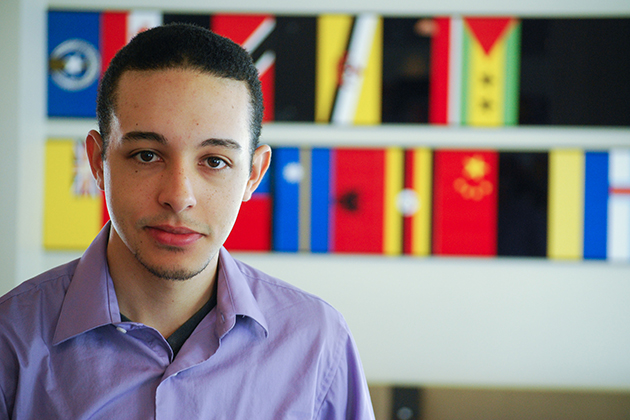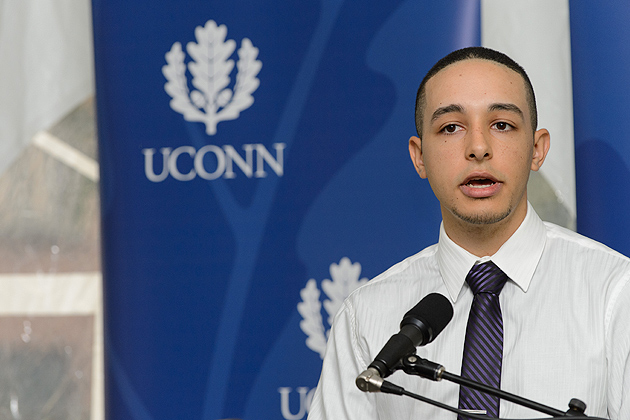
What are the characteristics of the people who staff our nation’s embassies around the world? If the traits and skills that Carl D’Oleo-Lundgren’14 (CLAS) has developed while at UConn are indicative of America’s Foreign Service officers, the future is in competent hands.
Fluent in Arabic and Spanish, and conversational in Japanese, D’Oleo-Lundgren has also studied French, Italian, Latin, and German “on the side. I found I have a knack for languages,” he says.
To advance his plan to be a career diplomat with the U.S. State Department, D’Oleo-Lundgren studied in an intensive Arabic language program funded by an endowment that UConn President Emeritus Philip Austin established. It’s one of about a dozen scholarships that UConn has awarded to D’Oleo-Lundgren.
“Carl has intellectual curiosity and a passion for international affairs and government,” says Austin. “He thought out what his interests were, and then he created an academic program that drove his ability to pursue his passion.”

Having created an individualized major in international relations, every indication is that he will realize his career goal. A few months ago he attended the 2013 Public Policy and International Affairs Junior Summer Institute at Princeton. And, among the 600+ who applied, D’Oleo-Lundgren is one of 20 undergrads to win a 2013 Thomas R. Pickering Undergraduate Foreign Affairs Fellowship from the Woodrow Wilson National Fellowship Foundation.
This prestigious pipeline for high potential Foreign Service professionals provides up to $40,000 toward expenses to cover the senior year of college and the first year of graduate study. After earning a master’s degree, the Fellows do diplomatic work in embassies around the world for a minimum of three years.
“It’s incredibly exciting,” D’Oleo-Lundgren says. “I hope I can contribute to the building of a policy that’s proactive and builds security for the people in the Middle East and in the U.S.”
During his first UConn study abroad, D’Oleo-Lundgren was a research and development intern for Community Solutions/Social Entrepreneur Corps in Guatemala, developing a text messaging system to support micro-consignment efforts in villages. He’s now about midway through his second study abroad, spending his entire senior year at the University of Jordan.
“One of the most important characteristics of a good Foreign Service officer is the ability to understand and empathize with foreign cultures,” D’Oleo-Lundgren says. “By taking courses in the history and politics of the Middle East while in Jordan, I’m building on that cultural adaptability. In my professional life, I’ll be better able to connect and communicate with my colleagues from Middle Eastern governments.”
His experience in Jordan is proving an eye-opener for the student who started out as a history major. “One thing that has struck me most profoundly since arriving in Jordan is how the same story can be told in totally different ways,” he says. “The history of the Middle East told from a Western perspective somehow yields different lessons, morals, and conclusions than when it is told from a Middle Eastern one. We focus on different aspects and characters, and we approach the study of history with different initial theories, so the same events can seem very different.”
Carving out an academic niche
Upon graduating with 26 high school classmates from the Connecticut International Baccalaureate Academy, D’Oleo-Lundgren enrolled at UConn to study history. He had reservations about how well he’d fit in as part of the Storrs 2010 entering class of 3,339. UConn offered a scholarship, as well as an invitation for the Manchester native to join the Honors Program.
“It was quite serendipitous, because it worked out perfectly,” says D’Oleo-Lundgren. “Today, as I relate to my fellow students both American and Jordanian, I realize the impact that UConn has had on where I’m headed in life. Most of the students on my study program here are from small liberal arts colleges. This contrast has made me appreciate the plethora of opportunities at larger schools and at UConn in particular. I quickly discovered so many opportunities at UConn – niches where I could place myself.”
His favorite course at UConn: the honors-level Politics of Oil, taught by associate professor of political science Oksan Bayulgen.
“It was a wonderful chance to look at the Middle East and see how oil and America’s interest in it have shaped that region,” D’Oleo-Lundgren says. Highlights of the course for him were a large research paper and an inter-university debate about oil politics the professor organized with an audience that included oil executives.

His co-curricular achievements include having served as director of the Model United Nations Environmental Program, facilitating a debate involving 30 people. He also served as a UNESCO Student Ambassador for Human Rights, meeting weekly with associate professor of history and UNESCO Chair of Comparative Human Rights Amii Omara-Otunnu.
“This was a growing experience for me, learning what human rights are, what they mean for me, and how they’ll play an increasing role internationally,” D’Oleo-Lundgren says. “Our major project was making people aware of how slave labor is used in producing chocolate. We spoke about fair-trade chocolate, to ignite the spark of awareness which hopefully grows into a flame.”
In his second year, he worked as a research assistant with associate professor Jeremy Pressman, associate professor of political science and director of Middle East Studies, who focuses on the Arab/Israeli conflict.
“We had a small research team, looking at Nixon’s and Reagan’s strategies, to determine which were useful,” D’Oleo-Lundgren says. “We developed a really cool relationship; Dr. Pressman had a lot of wisdom to impart to me.”
Pressman, who is D’Oleo-Lundgren’s Honors advisor, comments, “Carl is mature … a good listener. He has a keen intellect and a kind, engaging personality. He is exactly the kind of person I’d want representing the United States abroad or thinking through U.S. policy in Washington.”
D’Oleo-Lundgren also gained valuable experience in networking while serving as the student representative to the Mansfield Downtown Partnership’s Board of Directors.
“I was the liaison between the board and students,” he says. “In my many connections on campus, I spoke with students about what they’d like included in a college town. The fact that we built a downtown center from scratch, something that was nothing but a vision several years ago, gave me experience working with people to achieve an end. And all the board members have other professions, so that was also a practical networking experience for me.”
With so many varied experiences at UConn, D’Oleo-Lundgren is a perfect example of the global citizens the University is committed to developing.


